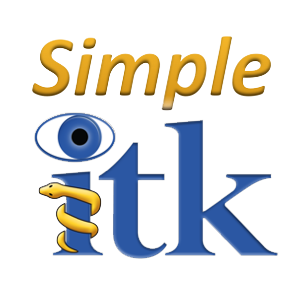SimpleITK
| NOTICE |
| This page is being migrated to Read The Docs!
For the up to date version please see this page! |
Overview
Welcome to the National Library of Medicine Insight Segmentation and Registration Toolkit (ITK). ITK is an open-source, cross-platform system that provides developers with an extensive suite of software tools for image analysis. Among them, SimpleITK is a simplified layer built on top of ITK, intended to facilitate its use in rapid prototyping, education, interpreted languages. SimpleITK has the following main characteristics:
- C++ library with wrappers for Python, Java, CSharp, R, Tcl and Ruby
- Object-oriented
- Provides a simplified, easy-to-use, procedural interface without templates
- Is distributed under an open source Apache 2.0 License
- Binary distributions for Python, Java and CSharp
SimpleITK captures many of features available in ITK, and is under ongoing development. Earlier in the development process a set of Specific Goals were outlined.
How to Cite
If you find SimpleITK useful in your research, please cite the relevant publications:
- Lowekamp BC, Chen DT, Ibáñez L and Blezek D (2013) The Design of SimpleITK. Front. Neuroinform. 7:45. doi: 10.3389/fninf.2013.00045
- Z. Yaniv, B. C. Lowekamp, H. J. Johnson, R. Beare, "SimpleITK Image-Analysis Notebooks: a Collaborative Environment for Education and Reproducible Research", J Digit Imaging., https://doi.org/10.1007/s10278-017-0037-8, 2017. (you can freely read the manuscript here)
Getting Started
- Getting Started For Users
- downloading the binaries
- build the code yourself
- additional software which is useful with SimpleITK
- A Visual Guide to Building SimpleITK on Linux
- A Visual Guide to SimpleITK with Java and Eclipse
- A Visual Guide to SimpleITK with CSharp on Microsoft Visual Studio
Download
SimpleITK currently provides binary distribution for Python, CSharp and Java language bindings. You can download the 1.0.0 release from SourceForge.
Documentation
API
- Nightly generated Doxygen.
- Release 1.0 Doxygen.
- Release 0.10 Doxygen.
- Release 0.9 Doxygen.
- Release 0.8 Doxygen.
- Release 0.7 Doxygen.
- Release 0.6.1 Doxygen.
Short Examples
Concise examples illustrating the usage of various SimpleITK features. Examples are written in a variety of languages including Python, R, C++, Java...
SimpleITK Notebooks
The SimpleITK Notebooks are examples and tutorials on how to use SimpleITK utilizing Jupyter Notebooks. This approach allows the user to create, edit and re-run scripts and view the results all within a web interface. The authoritative description of what Jupyter Notebooks are can be found on the Jupyter website. While SimpleITK supports a number of programming languages, the majority of notebooks are written in Python and some in R.
The main notebook repository is available on github.
Additional repositories containing tutorial specific notebooks are listed in the Tutorials section below.
SimpleITK Tutorials
Upcoming
- SPIE Medical Imaging 2018, Houston TX, USA: SimpleITK Jupyter Notebooks: Biomedical Image Analysis in Python.
Past
- The International Symposium on Biomedical Imaging (ISBI) 2016, Prague, Czech republic: SimpleITK: An Interactive, Python-Based Introduction to SimpleITK with the Insight Segmentation and Registration Toolkit (ITK)
- SPIE Medical Imaging 2016, San Diego, USA: ITK in Biomedical Research and Commercial Applications
- Tutorial material: git repository additional presentations .
- Medical Image Computing and Computer Assisted Intervention (MICCAI) 2015, Munich, Germany: a Python based tutorial on the use of the ITKv4 registration framework via SimpleITK.
- Tutorial material: git repository.
- ImageJ User & Developer Conference 2015, Madison, WI, USA: an introductory tutorial in Python.
- Tutorial material: git repository.
- Medical Image Computing and Computer Assisted Intervention (MICCAI) 2011, Toronto, Canada: a general tutorial on SimpleITK.
- Tutorial material: PDF of presentation, virtual machine, and git repository.
Community Blogs
These are blog entries written by people who are not necessarily directly involved with SimpleITK. If you want us to link to your SimpleITK blog entry just let us know on the mailing list (community@itk.org).
- General introduction of SimpleITK on the International Society for Computer Aided Surgery blog, 1 March 2017.
- SimpleITK and R, 22 May 2015.
- Medical Image Analysis Course, 20 December 2014.
- Image Segmentation with Python and SimpleITK, October/November 2014.
Support
SimpleITK is supported through the ITK community and the active developers. In addition to the resources listed above in the documentation section, the discourse forum can be used to ask questions and obtain additional help from the ITK community. The legacy ITK mailing lists is no longer prefered.
Issue Tracking And Feature Requests
We are currently using the github issue tracker. Before switching to github issue tracking we used an instance of the Legacy Jira Issue Tracker hosted by the University of Iowa.
Releases
- v1.0.1 Release Notes
- v1.0.0 Release Notes Downloads Doxygen
- v0.10.0 Release Notes Downloads Doxygen
- v0.9.1 Release Notes Downloads
- v0.9.0 Release Notes Downloads Doxygen
- v0.8.1 Release Notes Downloads Doxygen
- v0.8.0 Release Notes Downloads
- v0.7.1 Release Notes Downloads
- v0.7.0 Release Notes Downloads Doxygen
- v0.6.1 Downloads Doxygen
- v0.6.0 Downloads
- v0.5.1 Downloads
- v0.5.0 Downloads
Development
SimpleITK has moved to a Github based work flow for issues tracking and contribution.
SimpleITK utilizes an additional "next" branch to merge and test changes before merging into the master branch. This makes our "master" branch more stable and reliable. This follows the CMake development process:
Source Code Repository
SimpleITK uses git as the revision control system. The official repository is hosted along side ITK as http://itk.org/SimpleITK.git [1]. It is also mirrored on Github .
Development is currently following the branchy workflow with the Kitware stage repository. This workflow is described here:
Contributions from github will be pushed to the stage repo and merged into the next branch by a SimpleITK developer.
